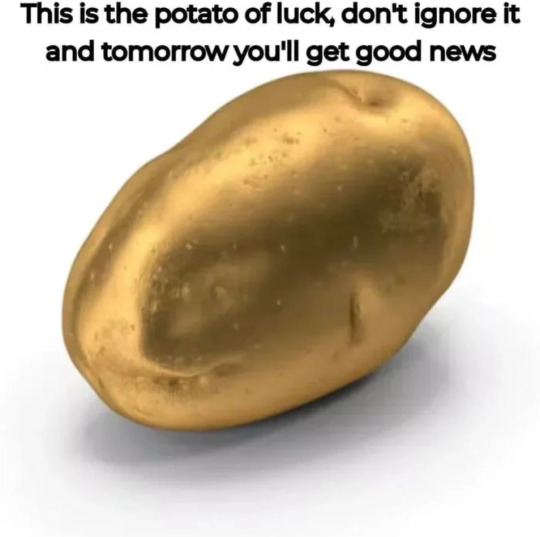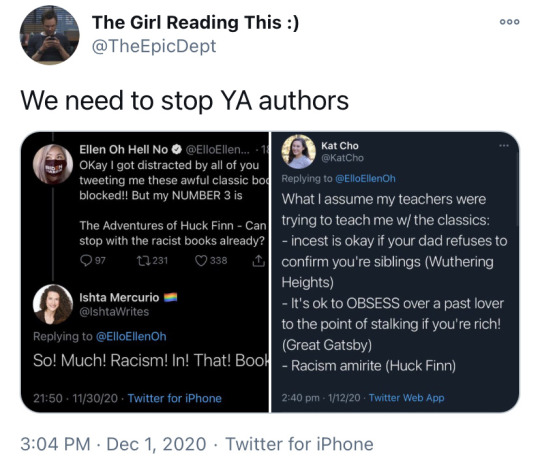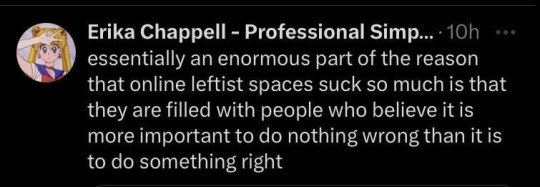Text
Please reblog for a greater sample size. I’m having a convo with my mom about this.
#self check out because social anxiety#I hate fumbling for my wallet and people waiting for me#and generally I don’t want to have to interact with people at the store#the pressure is real
4K notes
·
View notes
Text
youtube
Rónán Ó Snodaigh & Myles O'Reilly
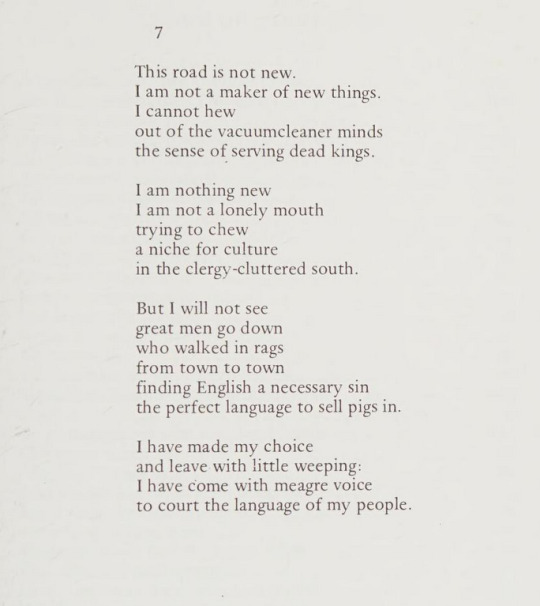
From 'A Farewell To English' by Michael Hartnett / Mícheál Ó hAirtnéide
40 notes
·
View notes
Text
Been obsessively playing Pentiment for the last couple days
If you have any interest in 16th century history and the Protestant Reformation I highly recommend it!!
It’s beautiful and emotional and probably the best game I’ve played in a long, long time
9 notes
·
View notes
Text
tfw you see some stupid post that paints medieval peasants eating just plain grey porridge and acting as if cheese, butter or meat was too exotic or expensive for them, and have to use all your inner strength to not just reblog it with an angry rant and throwing hands with people. so i will just post the angry rant here
no, medieval people did not only eat grey porridge with no herbs or spices, they had a great variety of vegetables we dont even have anymore, grains and dairy products, not to mention fruits and meats, all seasonal and changing with the time of the year. no, medieval food was not just tasteless, maybe this will surprise some of you but you can make tasty food without excessive spice use, and can use a variety of good tasting herbs. if you'd ever tried to cook some medieval recipes you would know that. medieval people needed a lot of energy for their work, if they would only eat fucking porridge all of the time they would get scurvy and die before they could even built a civilisation. they had something called 'pottage' which was called that because it was cooked in one pot. you could leave the pot on the fire and go about your day, doing stuff and come back to a cooked meal. they put in what was available that time of the year, together with grains, peas, herbs, meat etc etc. again, if you would try to make it, like i have with my reenactment friends, it can actually be really good and diverse.
dont confuse medieval peasants with poor people in victorian england. dont think that TV shows what it was really like. dont think that dirty grey dressed people covered in filth were how the people looked like.
they made use of everything. too poor to buy proper meat? buy a sheeps head and cook it. they ate nettle and other plants we consider weeds now. they foraged and made use of what they found. hell, there are medieval cook books!
most rural people had animals, they had chickens (eggs), goats (milk and dairy), cows (milk and dairy), sheep (milk and dairy) and pigs (meat machine), and after butchering they used ALL THE PARTS of the animal. you know how much meat you can get out of a pig, even the smaller medieval breeds? the answer is a lot
if you had the space you always had a vegetable garden. there are ways to make sure you have something growing there every time of the year. as i said they had a variety of vegetables we dont have anymore due to how farming evolved. you smoked pork in the chimney, stored apples in the dry places in your house, had a grain chest. people could go to the market to buy fish and meat, both fresh and dried/smoked. they had ale, beer and wine, that was not a luxury that was a staple part of their diet.
this post ended once again up being longer than i planned, but please for the love of the gods, just actually educate yourself on this stuff and dont just say stupid wrong shit, takk
27K notes
·
View notes
Text


art by The Baby Goat
99K notes
·
View notes
Note
haigh a chara tá siúl agam go bhfuil tú ceart go leor! i was wondering do you know any resources for learning Gaelainn? despite being from munster, in school we just learnt standard irish, but id really love to learn more munster irish. is breá liom do bhlag btw tá sé an-cabhrach <3
Míle baochas :) I do indeed know several resources, I made use of a lot of them lol, there's kind of two categories - Stuff about the dialect and stuff in the dialect. I'll start with 'about'.
Info about West Munster Irish
There's only 1 modern textbook I know of which teaches munster Irish, and it's kind of a rough read lol. This is Teach Yourself Irish (1961) (audio). The book is really really dense, one paragraph will contain a lot of information, and that can make it pretty easy to miss things, but it's still a very useful book - and much easier to use if you already have some Irish. It teaches Cork Irish but Cork and Kerry are quite similar (Kerry has a stronger Gaeltacht though so you're more likely to hear Kerry Irish). This book also has a weird transcription system for how to pronounce words, ignore it, learn the sounds of the language separately, and listen to the recordings that come with the book. Their system is buckwild and nobody else uses it.
You should also skip the sections labeled "rules for aspiration" and "rules for eclipsis", rather than reading them right at the start and use them as a reference if you ever need to.
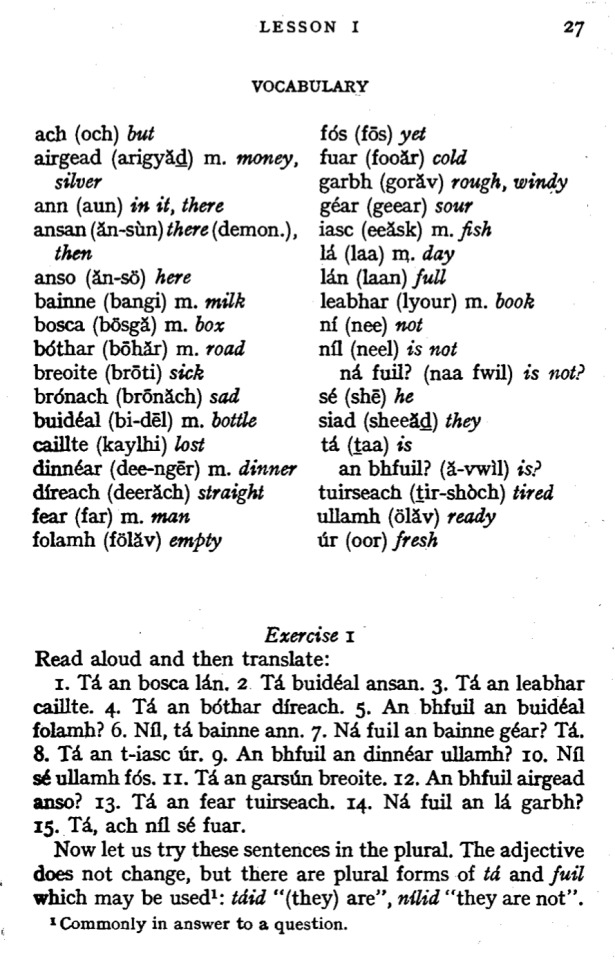
An Teanga Bheo - Corca Dhuibhne is a great book to get some knowledge on Kerry Irish as long as you can read Irish pretty well, since it describes lots of the important features. But it's a reference text and an overview, not a textbook. If you don't feel that comfortable reading in Irish or want to be able to search, you can use this online translation
Shameless plug, I talk about Munster Irish on my youtube channel, and I try and share info which people wouldn't find easily otherwise, new video maybe out this weekend maybe. An Loingseach on youtube - He sometimes gets bogged down in the linguistic weeds and doesn't edit his videos at all lol, but he knows his stuff.
There's a blog called corkirish.com and it has some useful info on it but the guy who used to run it is an awful shitter, I'm hoping that with more other people sharing resources we can make that blog irrelevant.
If you're at all interested in linguistics, there's more technical books describing the dialect which can be useful as references.
The Irish of West Muskerry - This is a book talking about the pronunciation of Cork Irish, in English, but using a lot of phonetic terms and symbols. Quite useful if you know how to read them.

Gaeilge Chorca Dhuibhne - This is a book talking about the pronunciation and structure of Kerry Irish, in Irish, again using a lot of linguistic terminology. This one will be getting an updated English version at some point soon, hopefully.
The Linguistic Atlas and Survey of Irish Dialects (LASID) is a series of books showing the results of surveys where they went around to different Irish speaking regions and asked them what words they'd use for specific things, it gives you really cool maps like this: (Showing you how "Gaeilic" is used in donegal, "Gaeilge" is used in Galway, and "Gaelainn" is used in Kerry)
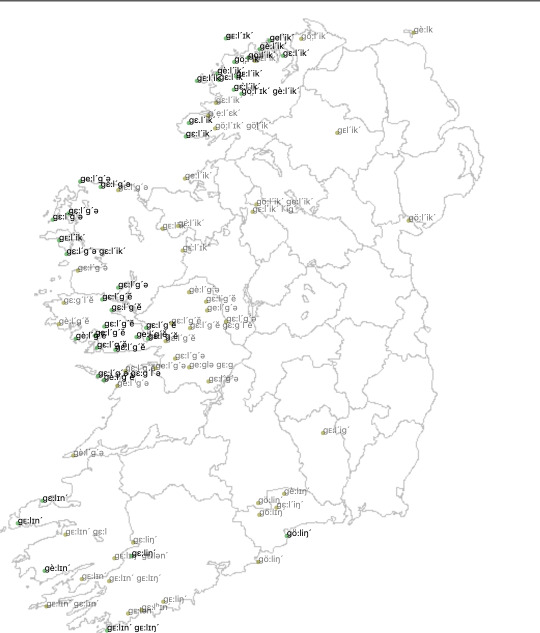
This map is actually from a web version of the first book which is quite handy. The second book isn't available as a site but there are pdfs and it only focuses on munster so you can see some differences with in munster.
Stuff in the Dialect
Things to Read
We're probably the luckiest in terms of things to read when studying the Munster Dialect because there have been so many authors, and so many authors who write very dialectally. So a lot of munster features you see very prominently in writing.
Books by Maidhc Dainín Ó Sé (a lot of fiction as well as one autobiography)
Books by Peig Sayers (There's school editions of at least her main book (Peig), try to avoid those and find the dialectal version in a library (Peig - a scéal féin), and she has written other books)
Books by Pádraig Ó Cíobháin (I haven't read any of these yet personally and I've heard they can be quite hard by nature of being very poetic and sometimes abstract)
Fiche Blian ag Fás by Muiris Ó Súilleabháin (similar to Peig, this is autobiographical)
Books by Tomás Ó Criomhthain (similar to Peig and MÓS these are autobiographical)
Books by Peadar Ua Laoghaire (Fiction, these are quite old - 100 years - and that can make them more difficult, but they can be pretty good)
Béaloideas and Dúchas.ie - these ones are harder to read than the others for various reasons but can often be a lot more interesting. Béaloideas is a journal of Irish folklore which you can find on JSTOR for free, and dúchas.ie has typed and handwritten stories collected in ireland, overlapping with Béaloideas to some extent. They can be harder to understand since sometimes the writing is intentionally over-dialectal to preserve the traits, but it's often more interesting since you can find fun little stories about different things. Stories from these collections are also sometimes put into smaller books or collections. (Béaloideas ó Chléire, an Seanchaidhe Muimhneach) you can usually find those books on Archive.org
Things to Listen To
Beo ar Éigean - Chatty podcast, one of the hosts has kerry Irish
Saol Ó Dheas - Munster Gaeltacht news show, not the most interesting if you don't live in the munster gaeltacht but there's a lot of it and the host has really good Irish, so you can focus on that even if the stories aren't gripping lol
Cartlann Bhóthar na Léinsí - Munster Archive show, they pull out older recordings of even more traditional speakers, and the host has very good Irish too, the older recordings are quite challenging to understand, but can be good.
Things to Watch
Seal le Dáithí - Talk show on TG4, host has Kerry Irish
Ros na Rún - Some of the characters have Munster Irish, it's a minority though
What did I do?
This isn't necessarily a guide, it's just what I did specifically.
After learning standardy Irish at school, I started talking to people on discord (Craic le Gaeilge and Celtic Languages), this was really helpful because I got to talk to a lot of knowledgeable people and get conversation practice even without being near to Irish speaking areas or events.
I also started listening to Beo Ar Éigean to practice my listening. I stuck to standard for a little while here and got to grips with basic grammar stuff because I was focusing on exams and stuff, but eventually I was taken with Munster Irish because some of the people I talked to a lot used it and because I liked synthetic forms. So I started working through Teach Yourself Irish with the help of people on discord, and that gave me a good basis in munster specific grammar and forms. From there I asked lots of questions (v important) and read the Irish of West Muskerry because I'm a nerd, wouldn't really recommend this if you're not that interested but it is kind of fun if you are. That helped me get a better understanding of Irish pronunciation (and spelling as a result of that). (I also read Peig at some point here) After that I started listening to a lot of Irish, trying to do at least 2 hours a day over one summer. An Saol Ó Dheas every day on my commute to work, and other stuff too, just trying to get as much exposure as I could. I use the host, Helen Ní Shé as my "language parent" - that is, I try to model my speech after hers. And currently I'm still focusing on just getting more and more exposure, and I've been reading more books in Irish.
48 notes
·
View notes
Text
Tá vs Is
Something that a lot of learners struggle with in Irish is when to translate "is/am/are" as "tá" and when to use "is".
Tá is a form of the verb bí in the present tense so anything I say about it applies to all of its forms. Is is something called the "copula" and again what I say about it applies to its other forms.
So for example you would say "Tá mé go maith" for "I am good" but you would say "Is múinteoir mé" for "I am a teacher". This kind of gets across the most basic rule which is that you use is when you're linking together nouns or pronouns:
Is múinteoir é - He's a teacher
Is múinteoir maith é - He's a good teacher
Is múinteoir é an príomhoide - The principal is a teacher
Is mise an múinteoir - I am the teacher
Is é an múinteoir é - He is the teacher
You can probably see above that the syntax can be a little bit complex there, the words aren't always in the same order as english and the structure can change depending on things being definite ("the teacher") or indefinite ("a teacher"). But I won't go into the details of that in this post.
Whereas you can use tá for other things, but not for linking nouns or pronouns together.
Tá sé anseo - He is here (adverb)
Tá sé go maith - He is good (adverb, kind of adjective)
Tá sé ard - He is tall (adjective)
Tá sé ar an mbord - He is on the table (preposition)
Something to note is that you can use the copula 'is' to link nouns and adjectives and nouns/pronouns like you can with tá, but it's less common and is more used for emphasis these days.
Is mór an fear - The man is big
Is láidir na mná - The women are strong
Or in another but more common structure
Is mór an fear é - He is a big man
Is láidir an bhean í - She's a strong woman
Let me know if you have questions about any of this or if you want me to go more in depth with the structure of the copula since I do think it's quite a complex part of the language.
174 notes
·
View notes
Text
I really think that some people don't understand just how much Kneecap has done for Gaeilge in the modern era.
Before Kneecap, I couldn't tell you a single artist who wrote songs in Gaeilge. Every interaction that I'd had with music as Gaeilge was in trad music and sean nós songs and let's be honest, most people don't really listen to them in their free time.
So that's why we all stan Kneecap for doing so much for Gaeilge 🫶
26 notes
·
View notes
Text
Pinned for easy access to fada letters:
á ó ú í é Á Ó Ú Í É
15 notes
·
View notes
Text
anyone else's Gaeilge motivation just
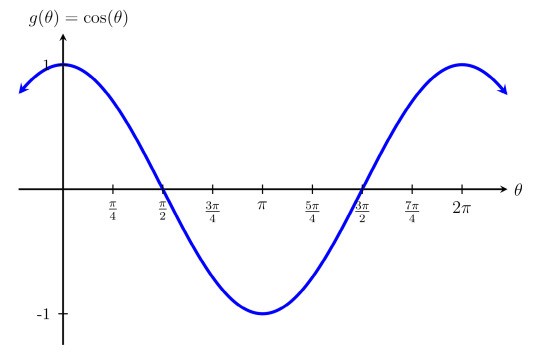
#yuuuuup#sometimes I flip back to Spanish and then my motivation for Irish suddenly skyrockets#it’s a good tactic lol#gaeilge#irish language
30 notes
·
View notes
Text

My Irish teacher moved back to America, and before she left, she gave/lent me her old copy of Gramadach Gan Stró, because I was complaining that the university's copy is in library storage and not borrowable. So, in order to properly appreciate this gift, I must now use it.
I swear I've learned Irish grammar half a dozen times at this point, and the rules just don't stick in my head, but learning it through Irish is a new challenge -- a lot of the technical/linguistic terms are unfamiliar to me, because I learned most of my grammar as part of learning Old Irish, where the terminology tends to be in English (and distinctly old-fashioned). Hopefully, though, the very process of learning it through Irish will help, because my brain won't be constantly switching back to English. That's the aim, anyway...
Knowing that I have a poor memory and usually have to learn things a dozen times, there's no value in going too slowly through the book, as I'll never take everything in the first time round anyway -- but I'm still trying to take it nice and steadily, and to actually do the exercises, not just skim over them. So it'll take a fair while for me to work my way through the book.
353 notes
·
View notes
Text
Finally making a new pinned post lol
Hi! I’m Em and am a huge history and linguistics nerd from the NW United States. Most of my posting here will be rambles, history, and language related reblogs.
If you’re into warrior cats, I’ve got a blog for that @skyscratch-wc, but this is my “main/personal” blog. So, if you’re into history and linguistics, you’re in the right place.
My main topics are:
1) evolution of religion and mythology (for the record, I’m agnostic, so that’s where my pov is coming from)
2) Northern European history from 1st - 14th centuries (late antiquity - the plague). Especially textiles and other archaeological finds type stuff
3) Archaeology. I think that’s all that needs to be said there.
4) linguistics! All of it. Most of my knowledge is European languages (especially the Celtic Languages) and North American languages. I am conversational in Spanish and Irish and I have dabbled in Welsh, Scottish Gaelic, Cornish, and German. I also grew up being taught little Tlingit lessons in school, so I know some bits and pieces there.
5) i’m also an engineer by day so i might post engineery type stuff here too lol
Hopefully you find something interesting here and thanks for stopping by!
0 notes
Text
#I thinkkkkk we’re about the same age#I might be slightly older but general vibes is say we’re close in age
7K notes
·
View notes
Text
If it keeps you from killing yourself it's not stupid. This applies to anything btw.
165K notes
·
View notes
